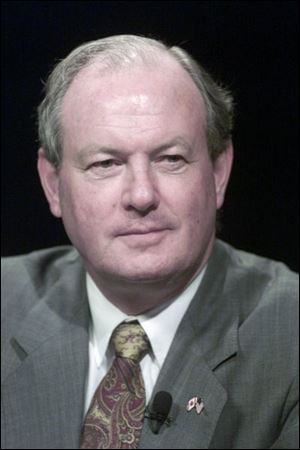
Saturday essay: U.S. can rely on Canadians' help
11/10/2001
Tennant: Count Canada in
The horrific events of Sept. 11 were a watershed, significantly altering our lives, our countries, and the world. That day redefined for each of us the challenges we face. These challenges are radically different and infinitely complex. The need to tackle these challenges collectively has never been more evident.
Americans may be sure of the solidarity of Canadians. No two countries in the world have a bilateral relationship so large, so unique, so close, and so intimate. We share your grief, your revulsion, and your resolve. We offer our sympathy, our prayers, and our support.
In the immediate wake of Sept. 11, Canadians received 234 planes with more than 30,000 passengers when our common North American air space was prudently shut down to commercial aircraft. Our flag - the Maple Leaf - flew at half staff like yours.
More than 100,000 Canadians gathered on Parliament Hill in Ottawa, along with others across the country, for a National Day of Prayer service. Canadians have gone to New York to lend a hand. Prime Minister Chretien has spoken frequently to President Bush and has visited Washington and New York. Canadians too are among those who are unaccounted for.
However, we are dealing with adversaries who do not stand arrayed before us on a battlefield. The fight involves much more than military means - its success requires sustained initiatives on other fronts: diplomatic, humanitarian, intelligence, security, and financial.
Since the attacks, the Canadian government has been moving forward in a systematic and deliberate way to introduce and implement a comprehensive package of domestic initiatives to prevent future terrorist actions.
Canada's Anti-Terrorism Plan (Bill C-36) is measured and focused and has four key objectives: to stop terrorists from getting into Canada and protect Canadians from terrorist acts; to bring forward tools to identify, prosecute, convict, and punish terrorists; to work with the international community to bring terrorists to justice and address root causes of such hatred, and to keep the Canada-U.S. border secure and a contributor to economic activity.
The plan's $180 million brings to $1.2 billion, the amount that Canada has invested in the policing, security, and intelligence since the 2000 budget.
A range of domestic measures have already been implemented to meet these objectives. They include enhanced security at Canada's airports, regulations to enable the freezing of terrorist assets, the criminalization of terrorist fund-raising, new funding to enhance integrated policing activities and information sharing among government departments, and strengthened immigration procedures that will prevent access to Canada by undesirable individuals which allowing entry for those who need our help.
Canada has committed its military to the international campaign, in response to President Bush's request. More than 2,000 members of the Canadian forces, six naval vessels, and half a dozen aircraft will be part of the coalition. Canada's contribution ranks third after that of the U.S. and U.K.
On the diplomatic and humanitarian front, Canada will continue to actively enhance relationships and contribute our experience to the international campaign. Canada is working with other countries, individually and multilaterally, including at the United Nations, NATO, the G-8, Commonwealth, la Fracophonie, and APEC, as well as other forums to build and maintain broad international support for fighting terrorism.
The Canadian government will make terrorism a key subject at the next G-8 Summit to be held in Canada next summer. In addition, as host of the November meeting of G-20 finance ministers and central bank governors, Canada will lead discussion to eliminate terrorist financing and enhance the stability of the global economy in the wake of the attacks.
We must respond by guarding and protecting our economic security. Continued access to Canadian markets is crucial for northwest Ohio. Canadian and American businesses depend upon efficient, predictable crossing times for goods and people. The automotive industry depends upon timely shipments to keep plants open in both countries.
Consider that Canada absorbs 53 percent, or $14 billion, of all Ohio exports. This figure equates to the value of all U.S. exports to Hong Kong in 2000, and is larger than Canada's imports from Japan, our number two trading partner. Our economic partnership should not be held hostage to these acts of terror.
Canadian and U.S. agencies working at the border have increased the use of overtime and part-time staff, cancelled leave, and reassigned resources from less critical activities to ensure security at the border and the continued flow of legitimate travelers and goods. As a result, while maintaining a heightened level of vigilance at the border, these extraordinary co-operative efforts have led to a significant reduction in border delays since the initial period following Sept. 11.
Prime Minister Chretien has established an ad hoc Committee of Cabinet Ministers on Public Security and Anti-Terrorism. It has met the U.S. Homeland Defense director to emphasize the importance of finding immediate solutions that will ensure security yet improve traffic flow at our borders.
Canada is committed to working with the United States to find workable systems of seamless, yet secure border management that focuses on enforcement activities on high risk targets while facilitating the crossing of legitimate goods and persons.
The Canada-U.S. border must remain a symbol of the interdependent and enduring partnership between our countries. Adversity builds strong bonds. America can count on Canadians' solidarity.
John D. Tennant is Consul General of Canada, based in Detroit, and a frequent visitor to Toledo.